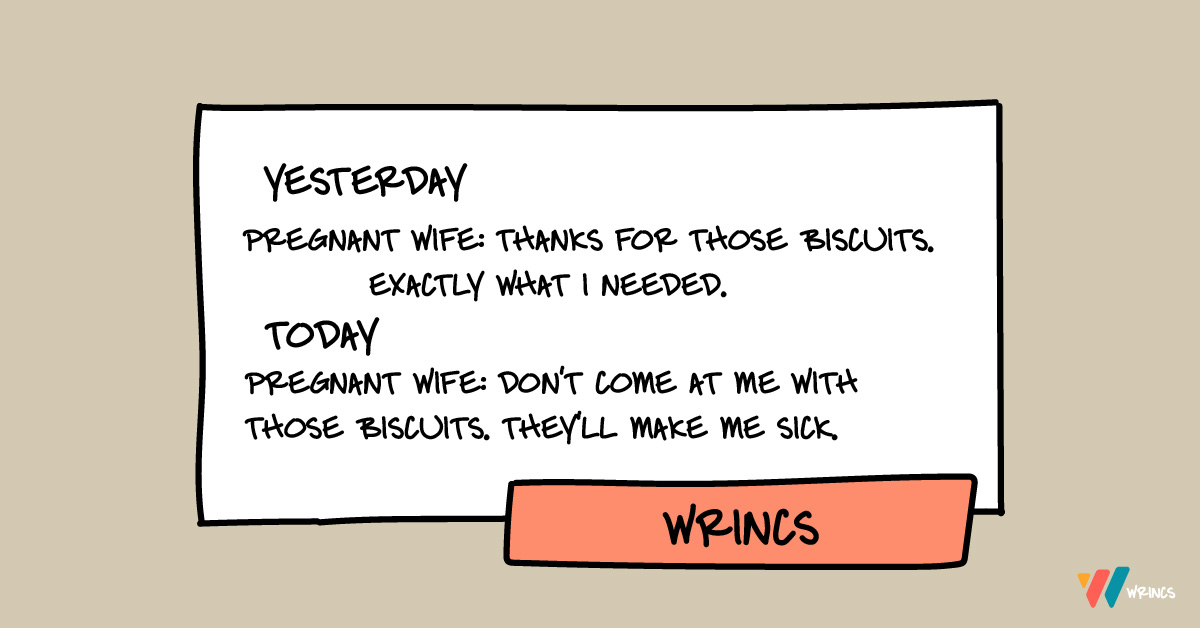In my last post, I mentioned my Initial Research which will lead to a pregnancy to-do list. The first part of this research involves wading through all the food and drink people say you should and shouldn’t put in your body while growing a human. This could be especially demoralising as Mrs Wrincs has Coeliac disease, so she’s already quite restricted. Regardless, finding out what you can and can’t eat and drink during pregnancy from reliable sources seems like a good place to start.
I Am Not An Expert – This Is Not Advice
Disclaimer: I’m not an expert and don’t know what I’m doing. Even official advice can vary in different parts of the world. This is not an “Ultimate Guide To What You Can and Can’t Eat and Drink During Pregnancy”. This is just me and my wife picking the next logical thing to figure out, researching it as best we can and writing it here to organise our thoughts. If it’s helpful to anyone, great. But, please do your own research, speak to professionals (when possible) and don’t be offended if we didn’t come to the same conclusions you did. Please let me know if you have advice or disagree. Try not to call me names if I’ve said something stupid, but if it entertains you, I can take it, so make it good.
I should also point out that we are doing this research together. We’re discussing it along the way and I don’t want people to think I’m an overbearing control monster. I can be very annoying to my wife in an amazingly wide range of ways, but I’m not telling her what to do. I’m just the one who’s writing it down.
How We’ve Approached The Research
The Internet can be a tricky place to get advice, especially for pregnancy. A lot of the forums are filled with questions like “Can I eat XXX while pregnant?” and the responses are often along the lines of “I ate XXX while pregnant and my baby is fine”. While I think those conversations are valuable, I’ve generally dismissed this kind of information (for this research) because I’m not really looking for anecdotal evidence in writing this post.
For me and Mrs Wrincs, we want to know the official guidance from the experts paid to know, then fill in the blanks and grey areas as best we can with help from people who have been (or are still going) through the same thing. For our starting point, as we live in the UK, it made sense to go straight to the National Health Service’s official advice. Now we’ve done this research, we’re very interested to hear your own experiences if you want to share them with us.
NHS Guidance For What You Can and Can’t Eat and Drink During Pregnancy
You can see the full NHS article of Foods To Avoid In Pregnancy here.
Cheese, Milk and Other Dairy
What You Can Eat
- Hard, pasteurised cheeses (e.g. cheddar, Stilton, parmesan).
- Soft pasteurised cheeses (e.g. cottage cheese, mozzarella, feta, cream cheese, paneer, ricotta, halloumi, goats’ cheese without a white coating on the outside (rind) and processed cheese spreads).
- Thoroughly cooked soft unpasteurised cheeses, until steaming hot.
- Thoroughly cooked soft cheeses with a white coating on the outside, until steaming hot.
- Thoroughly cooked soft blue cheeses, until steaming hot.
- Pasteurised milk, yoghurt, cream and ice cream.
What To Avoid
- Mould-ripened soft cheeses with a white coating (e.g. brie, camembert).
- Soft blue cheeses (e.g. gorgonzola, Roquefort).
- Any foods made from unpasteurised milk (e.g. soft goats cheese).
Why
- Unpasteurised dairy products may contain listeria, which can cause an infection called listeriosis.
- There’s a small chance listeriosis can lead to miscarriage, stillbirth, or make your newborn baby very unwell.
- Soft cheeses with a white coating on the outside have more moisture. This can make it easier for bacteria to grow.
Meat and Poultry
What You Can Eat
- Meats such as chicken, pork and beef, as long as they’re well-cooked with no trace of pink or blood; be especially careful with poultry, pork, sausages and burgers.
- cold, pre-packed meats such as ham and corned beef.
What To Be Careful With
- Cold cured meats, such as salami, pepperoni, chorizo and prosciutto (unless cooked thoroughly).
What To Avoid
- Raw or undercooked meat.
- Liver and liver products.
- All types of pâté including vegetarian pâté.
- Game meats (e.g. goose, partridge)
Why
- There’s a small risk of getting toxoplasmosis if you eat raw and undercooked meat, which can cause miscarriage.
- Cured meats are not cooked, so they may have parasites in them that cause toxoplasmosis.
- Liver and liver products have lots of vitamin A in them. This can be harmful to an unborn baby.
- Game meats may contain lead shot.
Eggs
What You Can Eat
- Raw, partially cooked and fully cooked British Lion eggs (eggs with a lion stamp on them).
- Foods with raw egg in them, such as mousse and mayonnaise, if they’re from British Lion eggs.
- Eggs that are not British Lion, as long as the whites and yolks are cooked thoroughly until solid.
What To Avoid
- Raw or partially cooked eggs that are not British Lion.
- Duck, goose or quail eggs, unless cooked thoroughly until the whites and yolks are solid.
Why
- British Lion eggs are less likely to have salmonella in them.
- Salmonella is unlikely to harm your unborn baby, but you could get food poisoning.
Fish
What You Can Eat
- Cooked fish and seafood.
- Smoked fish such as smoked salmon and trout.
- Raw or lightly cooked fish in sushi, if the fish has been frozen first.
- Cooked shellfish, such as mussels, lobster, crab, prawns, scallops and clams.
- Cold pre-cooked prawns.
What To Limit
- You should eat no more than 2 portions of oily fish a week, such as salmon, trout, mackerel or herring.
- You should eat no more than 2 tuna steaks (about 140g cooked or 170g raw) or 4 medium-size cans of tuna (about 140g when drained) per week.
- Tuna does not count as an oily fish (You can have 2 tuna steaks, or 4 medium-size cans of fish, as well as 2 portions of oily fish).
What To Avoid
- Swordfish, marlin, shark and raw shellfish.
Why
- You should limit tuna because it has more mercury in it than other fish, which can be harmful to your unborn baby.
- You should limit oily fish because they can have pollutants such as dioxins and polychlorinated biphenyls in them. If you eat too much of these, they can be harmful to your unborn baby.
- You should avoid raw shellfish because they can have harmful bacteria, viruses or toxins in them. These can make you unwell and give you food poisoning.
Other Foods & Drinks
Caffeine
You can have caffeine, but no more than 200mg per day.
Alcohol
Drinking alcohol can lead to long-term harm to your baby. If you’re pregnant or planning to get pregnant, the safest approach is to not drink alcohol at all. This keeps risks to your baby to a minimum.
Herbal Teas
You should drink no more than 4 cups of herbal tea a day.
Liquorice
Liquorice is safe to eat. But you should avoid liquorice root.
Fruits, Vegetables and Salads
Be careful with fruits, vegetables and salads as they can have soil on them, which can make you unwell. Make sure to thoroughly wash all fruits, vegetables and salad ingredients.
Peanuts
You do not need to avoid eating peanuts when you’re pregnant. Only avoid eating peanuts if you’re advised to by a healthcare professional or if you have a nut allergy.
Vitamins
Do not take high-dose multivitamin supplements, or any supplements with vitamin A in them.
Other Research For What You Can and Can’t Eat and Drink During Pregnancy
Oysters
It looks like they can be eaten if cooked thoroughly. If in doubt at a restaurant or at home, it’s best to avoid them.
Venison
Follow the same NHS guidelines for beef. Cook thoroughly until no trace of pink or blood.
Pre-Packaged Sandwiches
Although they aren’t specifically mentioned on the main Foods To Avoid page on the NHS website, there is a listeriosis page on their site that does name them as a risk. We’ve decided Mrs Wrincs will avoid pre-packaged sandwiches and wraps.
Deli Meats
Similarly to sandwiches, the NHS only put deli meats in the “What to be careful with” section but they also (again, elsewhere on their website) explain the risks they carry for listeriosis and toxoplasmosis. We’re planning to avoid them unless heated thoroughly.
Hot Dogs
Clearly processed, these go in a similar category to Deli meats. We would avoid unless thoroughly cooked at home (so we can be sure of the cooking temperature). Mrs Wrincs doubts she’ll be desperate for one, so has said she’s just going to leave them alone.
Sushi
That pesky listeriosis! You can see some guidance in the NHS fish section above, but this is a bit of a grey area and depends on the storage and preparation (which is hard to know about with any certainty). Sushi made with raw fish is a risk unless frozen. Even then, it seems there can be other bacterial issues along with the restrictions on fish portions. A lot of sushi contains soy sauce or some form of gluten so Mrs Wrincs thinks it’s too much of a minefield.
Bean Sprouts
Bean sprouts (and a few other sprouts like alfalfa, radish, fenugreek and clover) have been linked to salmonella, E. Coli and some other bacteria. They can be eaten if cooked thoroughly until piping hot they are steaming hot throughout. The main reason we would include them in a meal is for the crunch from not overcooking. For that reason, we’re just going to avoid these types of sprouts.
Water
Guidelines for water consumption seem largely the same as when not pregnant. We’ll just put more effort into avoiding drinking too little. Morning sickness could cause rehydration to become even more important.
How Mrs Wrincs Feels
She actually thinks this is more manageable than originally feared. She often likes simple meals and that’s proving even more true in the early weeks of pregnancy. She wants the comfort of mashed potato, gnocchi and melted cheddar on spaghetti. The odd can of Coke Zero is a bonus she didn’t think she could have and a regular mix of meat and fish through the week is fine with her. She’s a little disappointed that a few of her favourite restaurants are pretty much off-limits and she’ll surely want a few of the things that have been ruled out. But, overall, she thinks she’ll be fine.
Mrs Wrincs has already been struggling with morning sickness and was hospitalised. Where she’s been struggling to keep anything down, it makes it even more clear that you can’t expect to stick to your initial plans. If we originally said we would avoid something but it’s all she can stomach at the time, she’s going to eat it and that’s okay.
Everyone’s Different
Just to reiterate: This is not intended to be a guide. Just a log and breakdown of the information we’ve found and how we’ve interpreted it. I’m not an expert (very far from it); I’m just doing my best for our new family. If it’s useful to anyone, that’s great. This is not the “right answer”. This is just how an idiot and his wife approached a complicated topic. I’d love to hear any feedback or food and drink stories and anything you think I’ve missed or am wrong about so I can check it out.
Next Pregnancy Post: What You Can and Can’t Do During Pregnancy
Previous Pregnancy Post: Learning To Tackle Pregnancy Step-By-Step
First pregnancy post: I’m Pregnant. Now What?

